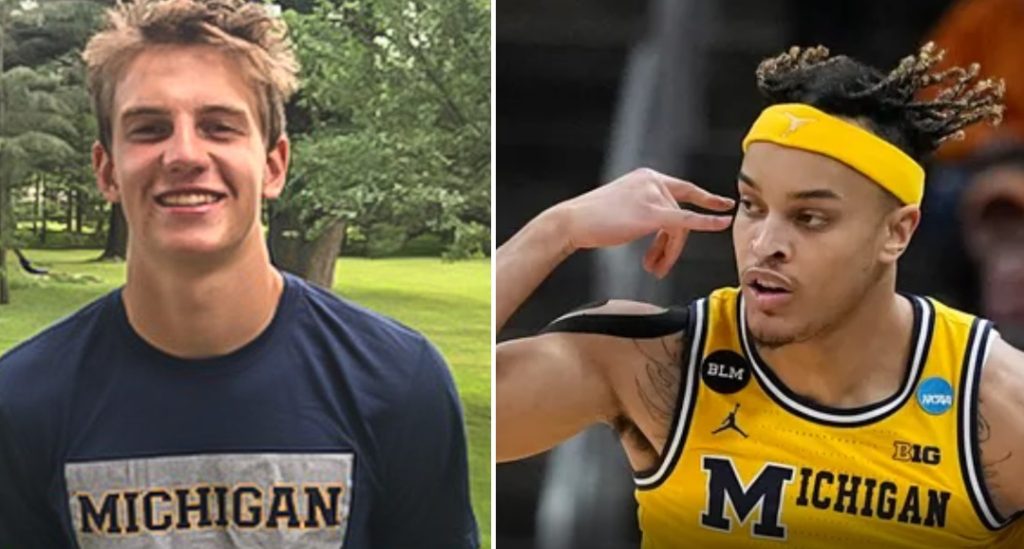The Michigan Wolverines will head into the 2022-2023 campaign with a roster lacking of two of their biggest rising stars, Caleb Houstan and Moussa Diabate, who both recently announced they would be staying in the 2022 NBA Draft.
Coming off of a Sweet 16 season, Michigan will need to replace Houstan’s outside shooting and Diabate’s rebounding and scoring in the paint.
The bad news is that both guys were on the verge of stardom in the college game.
The good news is that Head Coach Juwan Howard has options as to how he can replace the two potential first round picks.
A New Start at Point Guard
The Wolverines lost starter Devante’ Jones and backup freshman Frankie Collins from last year’s team.
Michigan fans lamented Collins’ departure especially, but they should be excited by the arrival of Jaelin Llewellyn from Princeton through the transfer portal.
Llewellyn has a smooth game and adds a size and three-point shooting to the position for Michigan that were lacking last season.
He hit on 38.6% of his attempts from deep last year compared with 34.7% for Jones and a 16.7% for Collins.
Llewellyn has great awareness and potential at the position, a smooth, quick release from outside, and experience. He plays with a forward-leaning momentum and is a threat to score, pass, or drive by his opponent at all times.
This combination could make him an excellent fit at the position along with the Wolverines’ young athletes at the forward and guard positions.
He averaged a career high 15.7 points per game last season for the Tigers.
The X-Factor at Shooting Guard
This position could be the biggest question mark for Michigan heading into next season.
Holdover sophomore Kobe Bufkin has lots of potential, and a lot to prove if he’s to become a Big Ten championship caliber starting two-guard.
The 6’4 Grand Rapids native often seemed to be just a tad off on many his shots last season, shooting just 38 percent from the field, but he also showed an impressive array of moves and solid athleticism for the position along the way.
If he makes the right adjustments and takes on the responsibility of being “the man” at the shooting guard position, he could thrive in a starting role.
A Company Man at Small Forward
Houstan’s departure leaves a void at small forward and in the three-point shooting department.
The keys to this position could be turned over to one of Coach Howard’s sons, either Jace or Jett Howard.
The pick here is that Jett wins the starting role, especially coming off of his Co-MVP performance at the Iverson Classic (watch highlights here) and subsequent rise in the ESPN rankings to #41 nationally.
Jace Howard has the talent to contribute, but he must become more focused in year number two and embrace the challenge.
An Expanded Role for Williams at Power Forward
Terrance Williams arrived to Ann Arbor as a highly-rated recruit and talented, versatile forward who seemed almost too energetic at times for his own good.
Williams improved his game by leaps and bounds last season while harnessing some of that ferocious energy. He shot 45.5% from the field, 38.5% from three-point land and 78.8% from the charity stripe.
The former four-star prospect from Clinton, Maryland has what it takes to ignite the Wolverines’ offense and make them a more versatile team across the board, although he will be undersized at the power forward position.
6-foot-8 sophomore Will Tschetter could also factor in here as could highly-touted freshmen Gregg Glenn and Tarris Reed, but Williams should get the first start at this position, flanked by returning center Hunter Dickinson in the post.
The All-American at Center
Hunter Dickinson became a Second-Team All-American at Michigan in his freshman year, and then went on to have a better campaign in year two.
Dickinson shot 0.0% on three-pointers his freshman year before doing the unexpected last season and adding a consistent long-range shot to his arsenal. He shot 32.8% from three and improved his outside shooting tremendously.
Dickinson also blocked 1.5 shots while hauling in 8.6 rebounds per game. On offense, he nearly tripled his assist rate per game while cutting down on turnovers slightly.
Now in his junior season, Dickinson’s continued improvement could have him in line for All-American honors yet again next season.
Other Candidates for Playing Time
Aside from the projected starting lineup, Michigan has plenty of talent heading into next season.
The backups should be, in order of projected minutes per game: Tarris Reed (PF), Will Tschetter (SF/PF), Dug McDaniel (PG), Gregg Glenn (SF/PF), Isaiah Barnes (SG/SF), and Jace Howard (SG/SF).
Several potential transfer portal additions are possibilities as well.
Of all these likely reserves for next year’s lineup, Reed, Tschetter and McDaniel stand out.
Reed has a polished game in the paint to go along with great strength and athleticism as a four-star freshman.
Tschetter (pronounced “cheddar”) was the number two ranked player in the state of Minnesota coming out of high school.
Coaches including Michigan assistant Phil Martelli believe he has the intangibles, drive, work ethic, and knack for the big moment to become a memorable contributor for the Wolverines by the time his career is over in Ann Arbor.
McDaniel’s ability to get out in transition, find his teammates on the break, and attack the rim could find him as part of quite a few highlight reels in his freshman season.
His passing skills could add an exciting element to a team full of athletic, dynamic finishers around the rim.
While the Wolverines will miss Diabate, Houstan, and Collins, McDaniel could be another in a long line of potential stars who could propel Michigan to their sixth straight Sweet 16 in 2022-2023.
Juwan Howard and his coaching staff have plenty of talent to work with, that much is for sure.
Dug McDaniel are you serious pic.twitter.com/IB4L4F2hvz
— Jake Rosen (@JakeInThePaint) January 30, 2021
